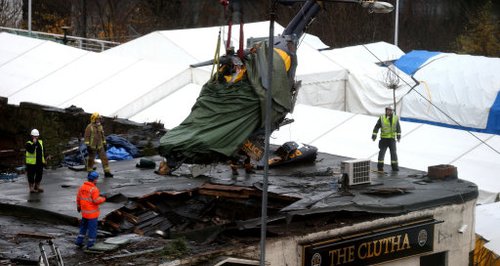Clutha: Faulty fuel sensors not changed
16 May 2019, 15:55

Faulty fuel sensors on the helicopter that crashed into the Clutha pub were not replaced in the weeks after a pilot alerted engineers about it, an inquiry has heard.
Craig Trott informed the maintenance team at Bond Air Services (now Babcock) about problem fuel readings on September 30 2013 - two
months before the crash that left 10 dead.
He was told two new sensors would be sent to Glasgow to "replace the existing faulty component" but technical logs up to October 10
recorded no changes to the main tank sensors.
Jim Remfry, head of maintenance at Babcock, told a fatal accident inquiry that he "would expect the work to be carried out".
The 58-year-old, a maintenance coordinator at the time of the crash, described the fuel readings outlined by Mr Trott as a "discrepancy" and not a "hard fault".
He said he could only surmise the sensors were sent and kept on standby.
The inquiry sitting at Hampden Park was shown the email exchange between Mr Trott and Mr Remfry with the subject 'G-SPAO fuel
indications'.
G-SPAO was the registration of the police helicopter that crashed onto the roof of the city centre bar, killing the three crew - pilot David
Traill, Pc Tony Collins and Pc Kirsty Nelis.
Seven customers enjoying an evening of live music at the pub also died - John McGarrigle, Mark O'Prey, Gary Arthur, Colin Gibson, Robert
Jenkins, Samuel McGhee and Joe Cusker.
Mr Trott said after refuelling to 310kg in the main tank he noted that it reduced to 295kg two hours later, increasing to 320kg after take-off
before reducing again "at a normal burn rate" during flight.
He wrote: "I understand that you will be calibrating and sending two new fuel probes up to Glasgow to exchange with two of those in the
aircraft."
The pilot said he would continue operating the craft, while adding 30kg to his minimum fuel calculations, and would brief the next day's duty pilot.
Responding to Mr Trott in an email on October 1, Mr Remfry wrote: "I have taken this issue up with Martin Forster, avionics manager, who
has hastened an existing demand for two of the later fuel sensors.
"He is confident that we should receive these at Staverton within the week and will then put a plan together to replace the existing faulty
component."
The maintenance manager said he was happy for Mr Trott to continue flying the helicopter while factoring the issue into his flight planning
calculations.
No record of the main fuel tank sensors being changed were recorded in technical logs covering the period up to October 10.
Mr Remfry said he could not remember if they had been changed, saying he assumed the work had been done.
Asked if it would cause him concern if the work was not carried out, he replied: "Yes, I would expect that work to be carried out."
He earlier told the inquiry that Bond had received a number of reports from pilots about discrepancies between the amount of fuel put into
an aircraft and the level appearing on the fuel display.
"This was discussed at great length by our management team," he said.
The inquiry before Sheriff Principal Craig Turnbull continues on Friday.







